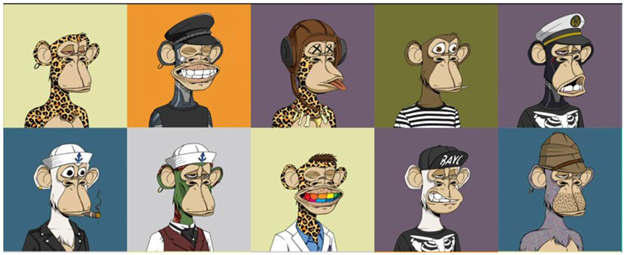Drag Queens, Bored Apes, and the Lanham Act – Two Recent Cases from the Ninth Circuit
The Ninth Circuit may not get all the fun cases, but they’ve had a good second half of July, 2025, at least in terms of Lanham-Act-related cases with interesting facts. Personally, I prefer drag queens to bored ape non-fungible tokens (NFTs), but each case is worthy of its own brief summary.
First up is Hara v. Netflix, No. 23-3768 (9th Cir. July 28, 2025), which involves a suit by Hara, know professionally as Vicky Vox, against Netflix and others involved in the animated show Q-Force. An image of an animated character resembling Vox (see comparison below) appeared not only briefly in the show, but also in an official teaser, and in a still promoting the show.
Vox had not consented to the use of her image and likeness, and was approached by some who thought that she was connected with Q-Force, due to the appearance of a character resembling her. She filed suit, alleging unfair competition and false endorsement under the Lanham act, along with state law right of publicity claims.
Vox appealed the dismissal of her federal claims by the district court. Section 43(a) of the Lanham Act (15 USC 1125(a)(1)(A)) allows for a civil cause of action for (among other things) a use in commerce of a name which is likely “to deceive as to the affiliation, connection, or association of such person with another person, or as to the origin, sponsorship, or approval of his or her goods, services, or commercial activities by another person.” The Ninth Circuit has applied the Rogers test for expressive works, under which Section 43(a) does not apply unless the use has no artistic relevance to the underlying work, or unless the use explicitly misleads as to the source or conduct of the work.
The main question at issue was whether the Rogers test was still applicable after the Supreme Court’s decision in Jack Daniel’s Properties v. VIP Products, 599 US 140 (2023), which was summarized by colleague Rita Kline here. In Jack Daniel’s the Rogers test was found inapplicable in the facts of that case, where an accused infringer was using another’s trademark (or a confusingly similar trademark) as a trademark for its own goods. The Court in Jack Daniel’s explicitly did not overrule the Rogers test, and the Ninth Circuit saw the exception in Jack Daniel’s as a narrow one, which was not applicable to the facts of the suit against Netflix. Accordingly, the dismissal of Vox’s federal claims was affirmed.
Bored ape NFTs seems like a bit of monkey business that has long receded from the public consciousness, but the Ninth Circuit just addressed them in Yuga Labs v. Ripps, No. 24-879 (July 23, 2025). Yuga created and marketed a collection of NFTs of bored apes, under the mark BORED APE YACHT CLUB (along with other associated marks). (Examples of the bored ape NFTs are reproduced below.) Ripps, a self-described conceptual artist, then marketed identical bored ape NFTs in a collection called “Ryder Ripps Bored Ape Yacht Club.” Yuga sued for trademark infringement, and Ripps countered that Yuga’s trademarks were invalid and not infringed. The district court entered judgment for Yuga on trademark infringement (and on a cybersquatting claim). After a bench trial on remedies Yuga was awarded over $8 million, and Ripps was enjoined from using Yuga’s marks.
Look, if even the apes at issue in the case are bored, I don’t know why the rest of us should show a lot of interest in the controversy. Suffice it to say that the Ninth Circuit affirmed the validity of trademarks but reversed the finding of judgment as a matter of law that Ripps infringed Yuga’s marks. Regarding validity, in his least-boring argument Ripps had contended that NFTs were not goods, but more in the nature of unregistered securities being sold in violation of securities law, and thus the marks should not be entitled to protection. The court turned this argument away on the basis that there was an insufficient nexus between Yuga’s alleged securities violations and its use of its marks in commerce.
The case was remanded for further proceedings whether Ripps’ activities caused a likelihood of confusion with Yuga’s marks.
The attorneys at Renner Otto strive to be authorities in all matters concerning the ever-evolving landscape of Intellectual Property; however, the information provided on our website is not intended to be legal advice, nor does it create an attorney-client relationship.
Contact us for more information or for a complimentary consultation.



